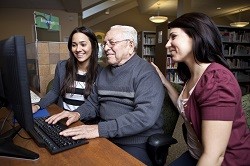Elderly care with least interference and maximum dignity
Ageing and its associated consequences in terms of frailty, chronic illness and multi-morbidity is challenging health and care systems. Particularly in Europe where the number of older people is expected to rise significantly, health and care models are proving to be inappropriate and unsustainable. Non-invasive senior healthcare system The EU-funded UNCAP(opens in new window) project has developed an interoperable ecosystem targeted to seniors. The key descriptors here that lend themselves to independence and dignity are location, monitoring and assistance. State-of-the-art physical/cognitive assessment tools are incorporated with technologies to locate objects, devices and users, both in- and outdoors. Monitoring is continuous yet non-invasive, and assists them in case alert conditions are detected. As the project’s coordinating officer, Dr Giuseppe Conti, explains, “This included the development of an interoperable middleware and a software client.” The middleware enables connection of a variety of different services and applications outside the system such as prescription reminders, healthcare monitoring and fall detection specifically designed for seniors. The software client facilitates their communications with a caregiver via a server. Pilots at real operational scenarios Starting in 2016 and extending into 2017, the achievements of the UNCAP system have been assessed by several pilots located in private homes, rehabilitation centres, daily nursing facilities and houses. Throughout various EU countries, involvement of a large number of users and caregivers ensured statistical significance. Analysis of results of the pilot phase will enable assessment of the impact of UNCAP in terms of return on investment for both public and private care systems, in both financial and societal terms. In social terms, the number of benefits is huge. The reduction of social exclusion and lessening of the burden on health systems and carers, both professionals and family members, must rate as the highest value to the elderly. Dr Conti points to the testing of the system as extremely key in UNCAP results. “The possibility of testing the overall set of technologies throughout a very large set of pilot sites, with different operators, different care models (formal and informal care), different regulations as well as different cultures has allowed us to identify the most valuable assets for future exploitation of the project results.” Meeting challenges head-on The most difficult aspect the team had to face was the administrative and procedural aspects related to ethical approval, which took considerably longer than initially planned. Some of the pilot sites, in fact, required a year to achieve full ethical clearance and this required a complete rescheduling of the pilot activities. The number of variables in the trial scenarios is so great, that a change in one often necessitated changes in another site. “Dynamic adjustments were essential to ensure statistical and scientific relevance of the results,” Dr Conti points out. Future steps for successful system launch The UNCAP project concluded at the end of 2017. The plan is to use a start-up company to bring the results of the project to market. “For this, agreements between the beneficiaries and the company have been established,” states Dr Conti. The rigorous testing of the technologies developed has been a tremendous opportunity to analyse the real needs of a market with significant potential due to a radical change in demographics, but which is still immature. Data and experiences arising from the pilots have helped identify the priorities and assess services that are most needed for a successful commercial exploitation while maximising the social benefit.







